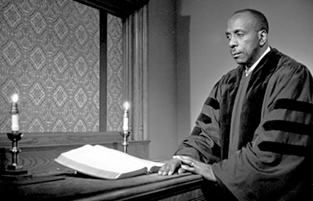Why God Speaks to Us: To Convict”
Pastor Hines
March 27, 2022
The beginning of this text from Luke is a complaint
that Jesus eats with sinners. The ending of the reading also emphasizes eating
with sinners. A father gives a party with a feast for his son who has sinned in
so many different ways. We all have our list of those we label as sinners.
Who’s on your list? Some list people who break the Ten Commandments as
“sinners.” People who break the Ten Commandments by using the Lord’s name in
vain or working on the Sabbath may not be labeled as sinners as much as they were
years ago. Serving other Gods by being greedy corporate managers, traffickers,
drug dealers, thieves, liars, or adulterers may get a frown from Christians,
but for most of us a “sinner” is a person we want God to judge and condemn
because they don’t give us what we want and know we deserve. A sinner is
someone we want God to send straight to hell because they make us mad or they
make our friends and family mad. We all have our list of sinners.
Jesus can sometimes makes us uncomfortable. His
lifestyle of eating with people we know as sinners does not sit well with us.
Jesus is a friend of sinners. Seeing Jesus sitting down, being friendly and
talking with someone we want to stay away from, may make us want to ask Jesus,
“What are you doing? Whose side are you on?” Seeing Jesus eating with
undeserving sinners, makes us less interested in accepting that invitation to
the Lord’s Supper. No doubt Jesus deliberately eats with sinners. That convicts
us. Shouldn’t we too be eating with sinners?
We might feel guilty. The question is do we feel guilty enough to ask
Jesus what we should do about it. Do we feel guilty enough to be ready if Jesus
calls us to pray for blessings on one sinner or another? Are we ready to have a
change of heart with some sinner or a conversation, or a cup of coffee, or even
sit at a table with Jesus? Are we at least ready to get ready?
Every story that shows the loving Jesus with one
whom some called a worthless sinner is a story that convicts us to do the same.
Luke tells the story of the Prodigal Son a young man who was called a sinner
because he left home after disrespecting his family and squandering his family
estate on loose living. A loving father, representing the Heavenly Father, the
Son Jesus and the Holy Spirit, hovered over the Prodigal Son’s life with love
and prayer. When the Prodigal Son returned home Love sat at a table and
prepared a feast fit for a sinner whom was cherished.
In this Lenten season, doesn’t it make you want to
take out your list of sinners and people you reject and name them one by one
and ask Jesus how we should pray for them, what change of heart we should have
toward them, what kind of conversation to have with them, or when to share a
cup of coffee or even sit at table with them along with Jesus?
We all have our stories. It is stories like the
Prodigal Son that convict us that we need to be like Jesus. Henri Nouwen
(January 24, 1932-September 21, 1996) Catholic priest, professor, writer and
theologian is known for his deep spiritual reflections, having written over 40
spiritual books. He saw himself in the story of the Prodigal Son. In his book
entitled Return of the Prodigal Son, Nouwen reflects that he and all of us can
be like the loving father who waited for his wayward son to return, like the
son who left home angrily,
Because we love our God, we want to hear God’s call
to conviction. We want to see Jesus at table with sinners because as Nouwen
says “Resentment and complaints, deep as they may seem, can vanish in the face
of him in whom the full light of Sonship is visible.” Love saves us, love cures us. Would that we
would be so convicted until we want to be with Jesus more and more even though
he is sitting and even eating with those we quietly think of as worthless
sinners or that anger us or our family and friends. Jesus is a friend of those
sinners we want to avoid. They are messy, upsetting, and inconvenient.
Love shows up at that table to save and to cure
sinners like you and me. Love shows up! How wonderful is that. It seems there
are so many stories that convict us. The question is are we convicted enough to
join the sinner at that table when it would be helpful.
I heard other stories this week that tell where love
has saved and cured. There was Christina* a poor Brazilian who was young and
beautiful. She ran away from home in hopes of a better life. Her mother Maria,
knowing what happens to girls that wander the streets, took several pictures of
herself with a note that said “Whatever you have done, whatever you have
become, it doesn’t matter. Please come home.” Maria posted her picture with the
note in every bar, hotel and bus stop she could until she ran out of money. Before
long, Christina found one of the notes and she did go back home.
In another story **Jason had a faith crisis when his
parents went through a divorce. He told his mom that he loves God but hates
God’s people. His lifestyle began to center around woman, alcohol, and drugs in
order to medicate the pain and struggle he had about his dad. She felt led to
give her son Joseph’s Prince’s book entitled Destined to Reign. He scowled when
she handed it to him but she was shocked to find him reading it during the next
few days. Eventually, he confessed to her saying, “Mom, I thought that God was
not healing my back because I don’t live right but God is going to heal me
because He loves me!” He then began sharing the book with his young friends.
Dateline*** had a story that reminded me that
sinners are everywhere, even in unusual places and everywhere love can save us
and cure us. They need a friend in Jesus. God may be asking us to join them at
the table. Nantucket had not had a murder in two decades, but a couple who had
both gone to the University of Notre Dame started dating. Theirs seemed like a
perfect world with perfect opportunities, no sinners in sight. Within 6 weeks
this perfect situation ended in a tragic murder of the woman at the hands of
her boyfriend who looked and acted successfully, but he himself said he was a
great actor. His character was rotten with excessive drinking, smoking, anger
and a murderous spirit. This story reminds us that Jesus is needed everywhere
and that sinners can wear fancy clothes, be highly educated, and live in nice
places or they can be lice ridden junkies who slobber.
Ryan Hampton a Clinton aide who, again, was the picture of success. He has a powerful story. After an injury he became addicted to opioids. He was in Florida when a law monitoring drug use made it harder for him to get pills from as many doctors as he could in order to feed his addiction. He knew if he tried, he would be arrested. He left a clinic with the most horrible withdrawal symptoms - vomiting, muscle pain, trembling. A heroin dealer was conveniently waiting for him in the parking lot. Heroin was cheaper and could quell the withdrawal symptoms. As a result of his addiction, Ryan lost his job and his home. He was homeless. I don’t know what his faith is, but it’s clear that he did not lose Jesus. Jesus was in his life to save him and cure him and to sit at table with him. His mother stood by his side and let him know that he could be saved, though 100,000 have died of overdoses and money goes into the wrong pockets while so-called rehab centers do not even have narcan that immediately revives overdose victims. Ryan is now in recovery and is an advocate for other addicts who are surrounded by doctors and others who prey on the pain of others by pushing pills for prophet. Ryan is working to change evil laws that are designed to hurt rather than help.
Hostage negotiator and crisis communication expert
Chris White presented a mental health webinar for our Conferences. He reminded
us that the pandemic has resulted in more experiencing poor mental health and a
rising epidemic of suicide. He urges churches to listen carefully to those who
show signs of distress, to listen without judgment, without trying to problem
solve, but ready to affirm that telling how they are stressed is very brave.
Chris encourages us to promote active listening and resources that help. We
have numbers on our bulletin for those who need help.
There is plenty of bad news in this world. We
Christians have good news. We are not the Prodigal Church. We have seen Jesus
being a friend to sinners, eating at table with them. Seeing him convicts us.
We want the world to know through our lifestyle that Love saves. Love
cures. Amen.
=
*Max Lucado, No Wonder They Call Him the Savior, Multnomah Press,
1986, pp. 158-9.
**Joseph Prince
***Dateline March 24





















